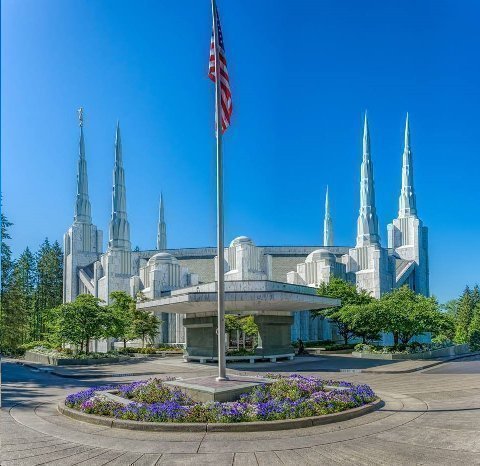Mormonism and Islam - Shared Values
Despite major cultural differences, Islam's and Mormonism's shared belief that the family should be the prime vehicle for transmitting ethical values will bring the two religions closer together as growing radical secular government abets dismantling the influence of religion and family centeredness in the lives of its citizens.


Above: The Akhmed Kadyrov Mosque (my image, June 1914), in Grozny, Chechnya, Russia and the Portland, Oregon LDS Temple (file image) have much in common architecturally. Does architectural continuity spill over into other similarities between Islam and Mormonism?
Despite major cultural differences, Islam's and Mormonism's shared belief that the family should be the prime vehicle for transmitting ethical values will bring the two religions closer together as growing radical secular government abets dismantling the influence of religion and family centeredness in the lives of its citizens.
In 1967, then a young LDS missionary stationed in Paris, France, I was browsing amongst the bouquinistes (book sellers) along the bank of the Seine.
I came upon a small, gray paperback, written in French, more than a pamphlet, but, less than a book, entitled something to the effect, "Similarities between Mormonism and Islam."
Curious about the title, I purchased the tract.
As a student in Cairo, Egypt in 1963/64 I had spent a lot of time around Muslims; most of my classmates at American University in Cairo were Muslim. Knowing Muslims didn't make me an expert in Islam, but I had visited Cairo mosques, hung out with Muslim friends, and knew the "headlines" of Islam. For example, the Five Pillars of Islam have much in common with LDS principles:
1. Daily, periodic prayer.
2. Give to the poor.
3. Pilgrimage to Mecca.
4. Fasting.
5. Belief in one God.
Mormons don't have a "pilgrimage" requirement (though they gather in Salt Lake City and via satellite at semi-annual General Conference), but Mormons do incorporate the other four "pillars" into their beliefs/practices. So, the premise of the booklet I purchased didn't immediately strike me as "ridiculous" as it did some of my missionary companions. Indeed, all religions have shared moral principles.
The booklet, it turns out, was a garden variety, anti-Mormon polemic. The author's intent was to degrade the Mormons by drawing parallels to what he believed were retrograde practices of Islam, such as polygamy. Shortly after reading it, I tossed the booklet out as just another of the many non-substantive, anti-Mormon tracts that were circulating at the time.
Time passed. I moved on.
In addition to living for a year in Egypt fifty-five years ago, I have lived six months Lebanon, three years India, and three years in the Philippines, all of which countries have significant Muslim populations. I've made numerous visits to Turkey, Indonesia and the Gulf states. I have motorcycled through southern Russia (Dagestan, Chechnya, Ingushetia, and North Ossetia) and visited the major cities of Uzbekistan (Samarkand and Bukhara). I have traveled overland in Iran, visiting Teheran, Isfahan, Shiraz and Kermanshah. I've paid several visits to Damascus, Syria. For eight years, during the late nineties and early aughts, I garaged a motorcycle in the primarily Muslim section of Nice, France. I've read more on Islam since those Paris days.
I'm still not an expert in Islam, but I'm generally knowledgeable, and grounded in real world, day to day experience in the Islamic world.
Accordingly, I've since learned that similarities between Mormonism and Islam go deeper than just the Five Pillars of Islam.
Each religion had a founding prophet who received visits from an angel, leading to revelation of a book of scripture. Both Mormonism and Islam experienced schisms after the founding prophet died. Each religion asserts that modern Christianity does not conform to the original religion taught by Jesus Christ. Both religions believe that good deeds are required for salvation. Mormonism and Islam emphasize charitable giving and helping the downtrodden. Both Mormonism and Islam have a strong emphasis on chastity, including modesty in dress. Each religion calls for prohibition of the use of alcoholic beverages... to name a few.
There are also significant differences between Mormonism and Islam.
Some of the differences are theological. Islam rejects Mormonism's belief that God has a body of flesh and bones. In Mormonism, Jesus is part of the godhead. In Islam, Jesus is "just another prophet." Mormonism believes that its adherents may become "gods" in the next life. Islam rejects this.
Culturally, there are major differences between Islam and Mormonism. Though today an international religion, the Mormon faith, founded in the 1830's, has developed within the American cultural context. Islam was founded in the on the Arabian Peninsula in the early part of the seventh century.
Mormonism is a Christian religion. Mostly for cultural and/or nationalistic reasons, Christianity and Islam have been antagonists over the centuries. Start with the Battle of Tours, in 732, when Charles Martel turned back the Saracens at the city's gates; or, the Crusades in the 11th and 12th centuries; or the Moors' conquest of Granada in 1492. Not to mention the fall of Byzantine Constantinople to the Ottomans in 1493. During the nineteenth and twentieth centuries, conflicts between Islam and Christianity have turned the Balkans into a tinderbox which seems to ignite every twenty years or so. The seeds of WWI were sown in cultural/nationalistic conflict between Islam and Christianity.
Notwithstanding historical cultural strife, or differences in theology, one commonality between Islam and Mormonism stands out more and more today: both religions, Islam and Mormonism, put strong emphasis on procreation. Both Islam and Mormonism view the family unit as the foundation for religious life and the transmission of values.
In the West, radical secularism, which has procreation as a low priority, is well on its way to replacing Christianity as the dominant cultural force. Just as Muslims clashed culturally with Christianity in centuries past, they resist the West's new secular, anti-family, anti-procreation doctrines.
Muslim extremists resort to terrorism as a way to resist secular, western cultural penetration into their "procreating" way of life. But, the mainstream of the Muslim religion also undergoes a spiritual awakening, largely driven by a yearning for cultural solidarity to resist the radical secularism of the west. Islamic culture may not be a wellspring of economic growth today, but it, both in its Sunni and Shia incarnations, is rife with spiritual energy and religious solidarity in the face of what it perceives as a growing secularist threat to its cultural survival.
Like Muslims, Mormons hold fast their family centered ethic in the face of countervailing pressures from the progressive state. For the present, at least in the US, where it is protected by the First Amendment (religious freedom) to the US Constitution, Mormon family culture, like Islam's, remains strong. Mormon proselytism efforts, like Islam's, continue robust. But progressives' government sponsored pressures on citizens to conform to secular dogma, in conflict with religious, family oriented, dogma, intensify.
Interestingly, as Europe and America "secularize," the commonality of Mormonism's and Islam's family centeredness is beginning to overshadow theological and other cultural differences. Look for an alliance of Mormonism and Islam to build around this principle as secular government's power accretes.
Today, fifty-five years after Paris, with the rise of radical secularism in the West, the putative parallels between Mormonism and Islam don't seem as far-fetched as they once did.
Stephen D. Taylor
13 July 2017